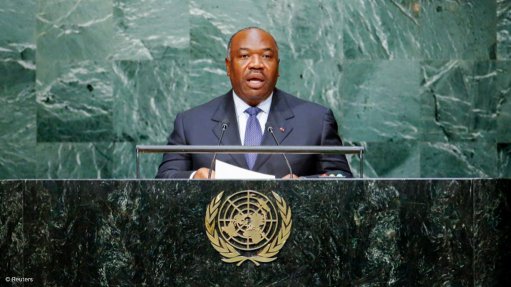
Gabon President Ali Bongo Ondimba
Photo by: Reuters
The United Nations Programme on HIV/AIDS (UNAIDS) has welcomed a decision by Gabon to decriminalise homosexuality, joining a growing number of countries in Africa that have removed criminal laws targeting lesbian, gay, bisexual, transgender and intersex (LGBTI+) people.
President Ali Bongo Ondimba signed off on the decision following a vote by Gabon's Senate on June 29.
“I applaud the collective decision by Gabon’s parliament, government and president to decriminalize same-sex sexual relations,” UNAIDS executive director Winnie Byanyima said.
“By doing so, Gabon is righting a grave injustice inflicted on the LGBTI community in the country.”
Paragraph 5 of Article 402 which criminalised same-sex sexual relations with a maximum penalty of six months in prison and a fine was inserted into the new Gabonese penal code in July 2019.
That paragraph has now been withdrawn, said Byanyima, adding that UNAIDS was encouraged that such a step back in terms of human rights could be overturned quickly when communities, civil society, politicians and other allies came together to right the wrongs.
UNAIDS argues that stigma, discrimination and violence against LGBTI people and criminalising same-sex relationships prevent people from accessing HIV prevention, testing and treatment services, increasing their risk of acquiring the virus, in addition to being a profound violation of a basic human right.
Gay men and other men who have sex with men had a 26 times higher risk worldwide of getting HIV in 2019 than other adult men. Prohibitive legal and policy environments created by stigma and discrimination were key barriers to reducing new HIV infections.
Byanyima urged at least 69 other countries and territories around the world that still criminalize same-sex sexual relations to follow Gabon's route, which UN human rights expert Victor Madrigal-Borloz called a good step for equality.
“It establishes a valuable protection for gays, lesbians, and bisexual, trans and other gender-diverse persons in Gabon, and lets them know that they are in a country in which their dignity and integrity is valued,” said Madrigal-Borloz, the UN independent expert on protection against violence and discrimination based on sexual orientation and gender identity.
“Countries around the world that still criminalise homosexuality and other forms of sexual orientation and gender identity must, without exception, take note of these proceedings and examine their own legal frameworks in order to become fully compliant with this human rights imperative."
He said criminalisation of homosexuality was one of the root causes of grave and pervasive human rights violations on the basis of sexual orientation and gender identity.
In May last year, LGBTQ refugees from South Sudan, Uganda and DR Congo marched to demand protection at the United Nations Refugee Agency office in Kenya's capital Nairobi, claiming to have fled from the Kakuma and Dadaab refugee camps to avoid life-threatening incidents.
According to experts on refugees and migration, the lesbian, gay, bisexual, transgender and queer refugees in Kakuma, many of whom fled homophobic and transphobic violence in nearby Uganda, continued to face threats and violence from locals and other refugees for the simple reason that they were LGBTQ.